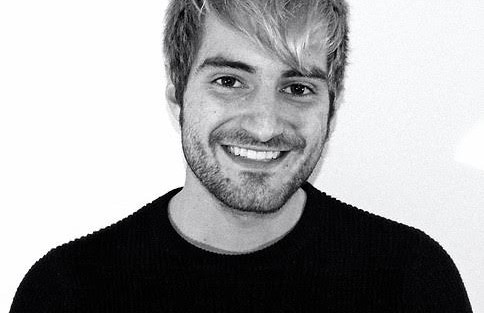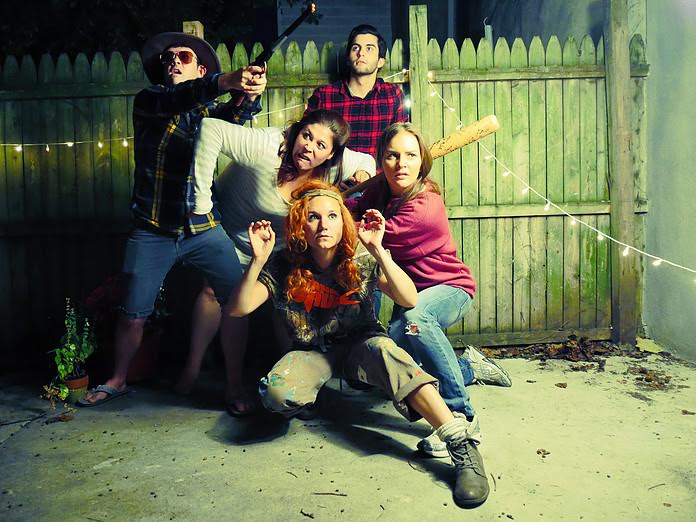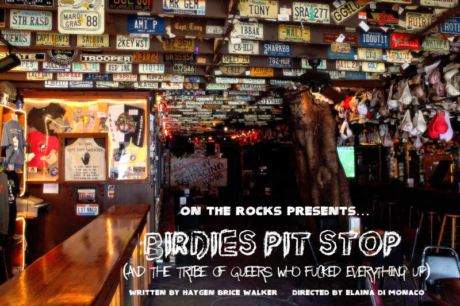Haygen-Brice Walker’s latest work, BIRDIE’S PIT STOP (AND THE TRIBE OF QUEERS WHO FUCKED EVERYTHING UP, featured as part of the Philadelphia Fringe Festival, is being produced by On The Rocks, the umbrella organization for the frequent collaborations between director-producer Elaina Di Monaco and playwright-producer Walker. Their collaboration began while getting their BFAs at the University of the Arts. Over the past six years, the duo has curated readings, created an original musical, produced play festivals, and co-founded both a writers’ group and Reject Theatre Project, an emerging artist collective.BIRDIE’S PIT STOP features Iman Aaliyah, Joe Canuso, Ashton Carter, Abby Garber, Jenna Kuerzi, Campbell O’Hare, Aaron Palmer, Katherine Perry, and Richie Sklar.
Walker and Di Monaco describe their company, On the Rocks, as “the product of an endless list of ideas and a hunger to make new work. The work is bold, it’s fearless, it’s provocative, and it’s queer (really, really queer). We’re not trying to make well-made, easily produced plays. We want to push the envelope and create an indelible, theatrical experience for our audience.” [The Pharmacy, 1300 S. 18th Street] September 9-17; 2016; fringearts.com/21199.

Henrik Eger: You are well known not only for your innovative approaches to writing but for your willingness to be brutally honest with yourself and to share freely—shining lights even into the darkest corners of your life, for example, your life as a little kid in the country.
Haygen-Brice: Yes,I grew up as a gay, Puerto Rican American, living in the most Conservative, Confederate flag waving backwoods county of Virginia on a 103-acre farm—an only-child with professional body-building parents. I was lonely, and as a result, I write a lot about displacement. There wasn’t a lot for me to do. So I got weird and creative.
Henrik: Could you give some examples of how you coped with your loneliness?
Haygen-Brice: Sure. One of my favorite things to do was to play Crime Scene Investigation in my shower. Along with soaps, loofahs, and shampoos, my shower shelves were stocked with an industrial-sized box of latex gloves, a scalpel (I got it from a chemistry set), a one-gallon bottle of fake blood, and a tub of Vaseline (to congeal the blood). I would take the blood, dump it on myself, and find an interesting way to lie in the tub as a murder victim. After I found a suitably ghastly way to lie in the shower, I would stand up, wash the blood off of me, strap on my latex gloves and become the investigator of the crime.
I would juggle these roles back and forth in the shower until all my hot water ran out. Sometimes I was a hooker who was bludgeoned in an alley, other times I assumed the role of the young boy that tragically fell from his bedroom window. I’ve been the cop investigating the crime, or the medical examiner dissecting the victim. That’s what I did from ages 7-11.
Henrik: Pretty spooky stuff for anyone, especially a little boy. Is it possible that some of those experiences during your childhood might have impacted your playwriting as a young adult?
Haygen-Brice: So much of an impact. Literally all of what I write I’m wrestling with something from my past or something in my present.
Henrik: Could you describe your plays that already were produced?
Haygen-Brice: My first short play, Hi. My Name is Wendy. And I’m In Love With a Lost Boy, had a small (non-university) production here in Philadelphia. It was an allegory of Peter Pan, but it was also about my struggle with sexuality as a high schooler. Campbell O’Hare, who I work with often, starred in the piece as Wendy. She was actually my high school sweetheart in Virginia. That made the process even more surreal and autobiographical, which ultimately helped me in crafting it into the most honest play it could be.
I then wrote a short play recently called Dad Shot Himself and Left Behind a Box Of Kink Porn. That play was about my grandfather’s suicide and the role that pornography plays on the psychology of relationships, which is something that I was dealing with at the time. Somehow, I found where these two ideas correlated and created the play.
Recently, my play Buzzfeed, Donald Trump, & Dead Black Kids premiered during the Philadelphia Women’s Theatre Festival. Buzzfeed was my reaction to all the commentary that I read on Facebook and heard from my high school classmates from back home.
Last year, Spookfish, premiered during the Philadelphia Fringe Festival and that was the first play in the trilogy. My idea with the trilogy is to deconstruct the horror genre. In Spookfish, I deconstructed the slasher genre of horror films.
Henrik: Tell us about your first attempt at playwriting. Was it also steeped in horror?
Haygen-Brice: It was The Devil’s Approach, which I wrote when I was seven years young, back in 1998. I think I wrote it in permanent marker and crayon on computer paper. It was like a really rough and kinky threesome between Scream, I Know What You Did Last Summer, and The Exorcist. It was absolutely horrific. It was bad.
Henrik: At this year’s Fringe, you are letting your BIRDIE fly out of the cage.
Haygen-Brice: I’m super excited about my Fringe show, BIRDIE’S PIT STOP (and The Tribe of Queers Who Fucked Everything Up), because it’s balls-to-the-walls nuts. The show is the second entry in my “Dead Teenager Trilogy.”

Henrik: Tell us more about BIRDIE’S PIT STOP.
Haygen-Brice: I’ve always been fascinated with possession and exorcism and what exactly it means to be possessed. This year I’m deconstructing the possession genre.
This play is bringing me back to my roots, set in rural (West) Virginia. Birdie’s Pit Stop is the shittiest bar in the shittiest part of the shittiest town. When a tribe of queers (from up North, obviously) crashes in, all hell breaks loose. Literally. A weird play about possession, human sacrifice, guns, drag queens, drag queens with guns, and Jennifer Lopez.
Henrik: You expressed some concern, seeing BIRDIE as a work-in-progress rather than a fully-fledged play. What would you like to do to this play to make it even stronger than it already is?
Haygen-Brice: What definitely surprised me about this play is how fucking cute it turned out. It’s darling. I’m not used to writing things that are cute, but this is the cutest I’ll get. It’s like baby-Easter bunny-in-a-purple-dress-cute. But there is still a lot of blood vomiting.
Henrik:In an oppressive society certain things can’t be said. Writers who break those taboos get punished. However, in the US, no matter how many Puritanical hang-ups may be influencing judgements in this country, writers like you will either get ignored or develop a following.
Haygen: People often tell me that my writing “shatters taboos,” or is “explicit,” or “uncomfortable,” which might be true, but I never sit down and write to shatter a taboo. I write the world the way I experience it. I write people the way I see them. I write places the way I taste them. The world is beautiful, but also hella scary. I think by not exposing the horrors of the world, we’re doing audiences an injustice.
Henrik: What is the driving force behind the in-your-face Haygenian honesty?
Haygen-Brice: We need to be confronted by scary things. The more we are challenged by them the more we will change and adapt—I think. I hope. I wish I saw more risks happening in theater. I think part of the reason that theater audiences are dwindling—particularly with young audiences—is because theater feels dated. I write plays about queer millennials doing fucked-up shit. Risk is in the DNA of everything I write. I want to change the stigma.
Henrik: Sigmund Freud would immediately ask about your childhood experiences and how they impacted your life.
Haygen-Brice: A lot of my work comes from an honest place of displacement. I knew I was gay when I was four years old—I literally gave a boy a kiss (with tongue). My parents were fairly conservative, less conservative than all the other Confederate flag-waving people that were in my town, but conservative nonetheless. And they are super athletic professional bodybuilders—however, I was not athletic.
Henrik: Tell us about your background.
Haygen-Brice: My mom was Puerto Rican, but I never picked up Spanish. Isolated. My dad collected guns—I didn’t. Isolated. I was an only child, gay, Latino, and living in a huge forest—spending day and night talking to myself and dreaming of living in the city.
Don’t get me wrong, my parents and I are super close. We’re practically best friends, but growing up, we didn’t have a whole lot in common, except that we were all exceptionally weird.
Henrik: How easy or difficult was it to write your new play and how would you classify it?
Haygen-Brice: BIRDIE’S PIT STOP (and The Tribe of Queers Who Fucked Everything Up) is a play that has been super difficult to write. I’ve rewritten it at least four times—and it’s still not done. A lot of times, theater artists are so precious with their work, but I just wanna throw all the shit on the wall and see what sticks. It is definitely “junk-food” theater. Not every play has to be A Streetcar Named Desire. Sometimes we need to just have a good time at the theater. And laugh.
Henrik: Ultimately, what is your play about?
Haygen-Brice: For me, the play, in its latest form, is about acceptance. And how our preconceived notions inform our viewpoint on “the other”—whoever or whatever “the other” might be.
Henrik: You have built quite a following of actors and directors in Philadelphia.
Haygen-Brice: True. I am blessed—by someone. The theater gods. Or Oprah. And certainly by my collaborators here in Philadelphia who have been the best crew I’ve ever worked with. They even have written this play with me. They’re incredible.
Campbell O’Hare and Jenna Kuerzi have done three Fringe shows with me now. I write for them. If I can impress them, I can impress myself. Every year we hold auditions to add more members to our ensemble. We call them “THE GOONFUCKS.” Some actors come back year-after-year, other do a show or two, but it feels really special that through my work I have been able to curate a group of people that want to make theatre magic.
I’m also constantly seeing theatre that my peers are participating in. I saw Abby Garber in a University of the Arts production of We Are Proud to Present a Presentation and I knew that I wanted to work with her. It took me two years to finally nail down a project for her. She’s phenomenal as the queer millennial Penelope in the Tribe of Queers.
Henrik: Tell us about your artistic director, the much sought after Elaina Di Monaco, and her work on BIRDIE.
Haygen-Brice: Elaina is pretty much my soulmate. Working with her has been a dream. We’ve created two theatre collectives in town: Reject Theatre Project and On The Rocks. Each time we work together it gets easier. We complete each other’s sentences. We’re in each other’s heads. We may have been separated at birth. I’m waiting for the news that we’re secret twins or something.
Henrik: Given that you operate on the shoe-stringiest budget of any theater company outside West Virginia, what makes popular Philadelphia actors audition for you in show after show?
Haygen-Brice: I think one of the reasons that actors return to work with Elaina and myself is that we really embrace every actor’s individual nuances and quirks.
Henrik: Who created all the various characters with their wide range of quirky dysfunctions in your play?
Haygen-Brice: The characters in BIRDIE’S PIT STOP were definitely created just as much by the ensemble as they were created by me. Elaina, above all, gets the material, because she gets me. The ensemble members, Elaina, and I are the definition of queer millennials. The characters in my play are inspired by conversations that we had over cheap margarita pitchers at Buffalo Wild Wings while going hard on boneless wings, smothered in bleu cheese.
Henrik: Whom would you like to see in your audience? Traditional theater-goers, young people, members of the LGBT community, Puerto Ricans, West Virgina body builders, psychologists, or shower installers?
Haygen: Because BIRDIE is so wild and funny and weird, everyone would love it. I want to get asses in seats that aren’t the typical theatre-goer. I want to see my Point Breeze [multicultural neighborhood in South Philly] neighbors in the audience. I want to see the customer I rang out at Express [American fashion retailer for young people] in the audience. I want to see Trump supporters in the audience—because they would protest it.
Henrik: What would you like Fringe theater audiences to know about your latest play?
Haygen-Brice: I mean, this play is in a special category of theatre that more often than not is marginalized. The play is total junk-food theatre. Like I’m talking curly fries slathered in bleu cheese-junk food. It’s not the best thing for you. It’ll probably clog your arteries, but it’ll taste so fuckin’ good you won’t care.
Most junk-food theatre is commercial, think Wicked or Noises Off. Ours isn’t. It’s totally underground and weird. And that combination of non-commercial-junk-food is something that I don’t see often in theatre. I want to shake shit up.
But this play is dumb. Legitimately. And that’s not me insulting the work or fishing for a compliment. I love it. This play is not going to win the Pulitzer. Hell, it’s not even going to win an Obie. Not every theatre experience has to be deep, prophetic, moving, and emotional. Too often, theatre-artists take themselves too seriously. Sometimes, shit isn’t that deep. Theatre doesn’t have to be one thing. It can be many things—and it should be many things.
 Henrik: In wrestling with your past and confronting life as you perceive it today, where would you like to go with your writing during the next ten years?
Henrik: In wrestling with your past and confronting life as you perceive it today, where would you like to go with your writing during the next ten years?
Haygen-Brice: The challenge for me is how to balance my personal life, my day-job, and my writing. It is definitely a challenge. I think I just want what every writer wants: I want writing to become my career and not a hobby.
I want to keep challenging the system. Keep provoking people, making them scared, making them uncomfortable, showing them something new. I think it’s important for makers to remember that realism and truth are not the same thing at all. Not even a little.
Henrik: Could you share something with us that only your best friends know about you?
Haygen-Brice: Literally so much of what I write is from actual experiences. Like real, ridiculous conversations that I have with my friends or anecdotes they’ve shared with me. The people that spend the most time with me are almost always onstage. My boyfriend, Kevan Sullivan [Koresh Dance Company], bless him, is always in my work. A lot of direct quotes. So really, I just surround myself with fascinating people that always have crazy shit to say. And then I compile it and make it into a story. My friends are ridiculous humans. Beautiful, ridiculous humans.
Henrik: Is there anything else you would like to share?
Haygen-Brice: Come see our show! It’s BYOB. So. Bring a Four Loko—or three.
Henrik: With all those Lokos being emptied, how loco [crazy] will it get during the performance of BIRDIE’S PIT STOP? I dare not ask how loco it will get after the show. I fear the Fringe may never be the same again. Cheers and bottoms up!
BIRDIE’S PIT STOP (AND THE TRIBE OF QUEERS WHO FUCKED EVERYTHING UP)… The Pharmacy, 1300 S. 18th St., Philadelphia. Two hours. September 9-17, 2016 at 10, 11, or 11:30 pm; http://fringearts.com/event/21199/

One Reply to “A Little Bird Who Fucks Everything Up: Interview with Haygen Brice Walker, the new enfant terrible of Philadelphia”